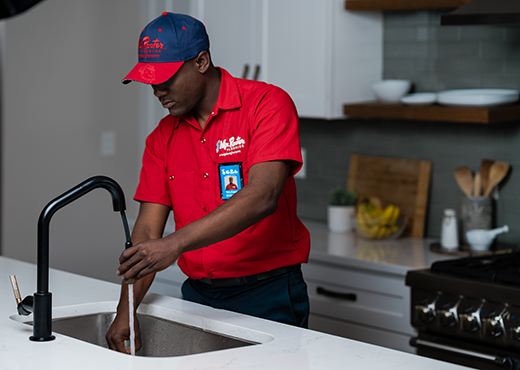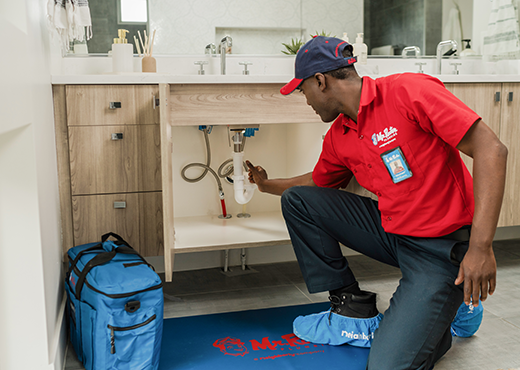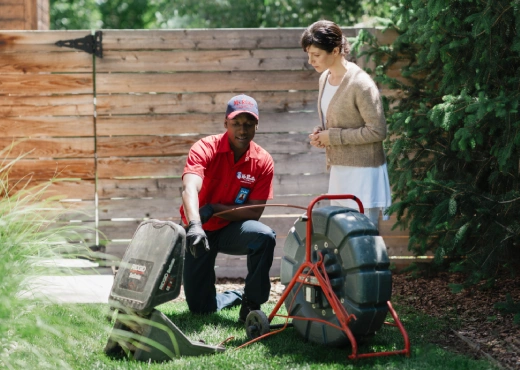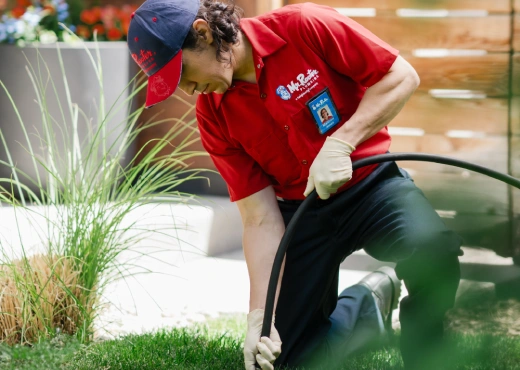Residential Plumbing Services
Everyone encounters typical problems like clogged drain lines at some point, and often, all it takes is a plunger and some elbow grease to get the issue resolved. But your residential plumbing system is complex, with hundreds if not thousands of individual components, and that means there's plenty of potential for damage and deterioration that can disrupt the daily routines of your household and make your life a lot less convenient. When that happens, we can help with our experienced team of plumbers. Traverse City professionals are here to help. Our plumbing services include help for problems ranging from hot water heater installation and sump pump repair to trenchless pipe replacement, drain cleaning and toilet replacement.
Commercial Plumbing Services
Business owners are busy people because they have to stay focused on the big picture while at the same time attending to a million little tasks that need their input. That doesn't leave much time to deal with clogged sewer lines, leaking water supply pipes, and all the other things that can go wrong with a commercial plumbing system. That's where our Traverse City plumbers come in. Count on our team to show up on time and complete the agreed-upon work correctly so you don't need to worry and can give your attention to more pressing matters like pleasing your business customers.
24-Hour Emergency Services
Why does it seem like plumbing emergencies never happen at 10 a.m. on a Thursday? Instead, they wait until the most inopportune moments to strike, like the middle of the night or the start of a long weekend when it seems impossible to find Traverse City plumbers who will show up and get the problem under control. Local homeowners and business owners don't have to struggle alone with a plumbing emergency.
We understand that plumbing problems wait for no man, which is why we offer 24/7 service from qualified emergency plumbers. Traverse City residents and those in nearby communities can call us any time of the day or night, and we'll have a licensed plumber on your doorstep as soon as possible to restore your plumbing system to full function.
Preventative Plumbing Maintenance
No one wants to struggle with plumbing that doesn't work correctly or constantly worry about when the next plumbing disaster is going to occur, leaving you in need of local Traverse City plumbers. The best way to give yourself peace of mind is with routine, professional preventative maintenance by reliable plumbers. Traverse City homeowners and business owners can actually save a lot of time, money and stress over the years by investing in the right plumbing maintenance services, such as hydro jetting for your drain lines.
Any homeowner who has been forced to deal with major issues with wastewater disposal lines will tell you it's a hassle that's well worth avoiding, and annual hydro jetting can leave you with the assurance that you won't be facing a nasty sewer backup or stubborn clog any time soon. Not only does professional plumbing maintenance from reliable plumbers in Traverse City, MI leave you confident that your plumbing system is in good shape, but it also turns the clock back on wear and tear damage, extending the overall life expectancy of your wastewater disposal system so you can avoid the need for major repairs and replacements longer.
Be ahead of the curve with experienced Traverse City plumbers, and book an appointment for maintenance and repair!
Why Choose Our Plumbers, Traverse City Home and Business Owners?
Our repairs are high-quality because we have the best Traverse City plumbers in the business. Mr. Rooter Plumbing professionals are all licensed, bonded, and insured with years of experience under their belts, so our customers know their plumbing is in good hands. When the plumbers Traverse City can depend on appear on your doorstep, they'll be ready to provide a free estimate, high-quality repairs, and a friendly smile—each of which is an important part of who we are. As a locally owned and operated business, we take great pride in delivering the best quality of workmanship combined with customer service that always goes above and beyond from Traverse City plumbers.
Workmanship and Parts Guaranteed
There are few things more frustrating than getting repair or installation services and discovering shortly afterward that the work wasn't completed correctly or faulty parts were used. That's never a concern when we're on the job. We always hire the very best plumbers Traverse City has to offer, and we're completely confident that they'll deliver top-quality services and parts. That's why we stand behind our Traverse City plumbers with a guarantee on all workmanship and parts.
Locals Recommend the Best Plumbers in Traverse City
It'll come as no surprise that we believe our dependable Traverse City plumbers are the best choice for plumbing services that meet or exceed the highest industry standards. But there's no need to take our word for it. Check out our customer reviews to learn more about what local property owners truly think about our services and why they recommend our plumbers! Traverse City friends and neighbors are well taken care of by our consummate professionals.
Courteous, Professional Customer Service
When you invite our Traverse City plumbers into your home to carry out plumbing services, you need to know that they're capable of getting the work done right—but it's also important to have the reassurance that you'll have a safe, pleasant experience while they're on your property. Every member of our team can be trusted to display courteous, professional behavior at all times, down to our last plumber. Traverse City professionals at Mr. Rooter Plumbing take pride in delivering the highest level of customer service on every job.
If you'd like to hear from your local community members about why you should choose our services, check out our 5-star ratings. You'll get some background into the work we can perform and how we've mended local plumbing systems to get them back to their prime.
Upfront, Flat Rate Pricing
At Mr. Rooter Plumbing, our Traverse City plumbers understand the frustration that homeowners sometimes experience when it comes to dealing with plumbing services. One common complaint is uncertainty about the final cost of plumbing services from professional plumbers. Traverse City, MI plumbing companies may force customers to wait until the work is completed to know how much they will be charged. However, Mr. Rooter Plumbing of Traverse City is different.
We strive to eliminate any stress for our clients by implementing an upfront, fixed-rate pricing model when you hire our team of professional plumbers. Traverse City plumbing experts will visit your property, assess your plumbing system, and provide clear recommendations along with a competitive price for the required work. With us, you will know the exact amount you will be billed before we get started on any work, and our Traverse City plumbers guarantee that there will be no additional fees or hidden charges to surprise you once all is said and done.
Are you in need of high-quality plumbing maintenance or repair services from qualified plumbers? Traverse City locals can request a service from us today!







